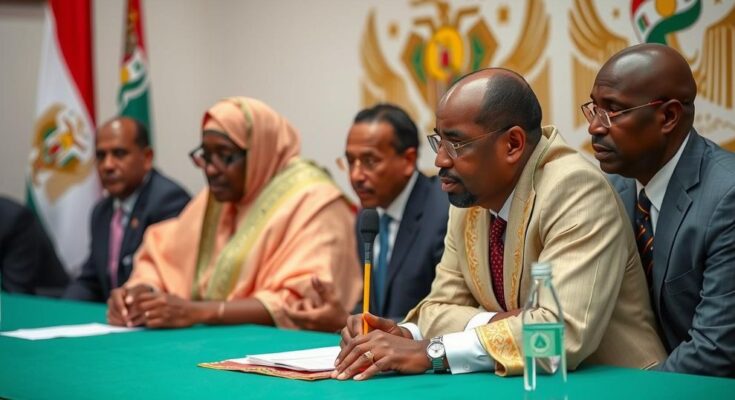Egypt aims to take a leadership role in a new African Union mission in Somalia to combat Al Shabab, amidst ongoing tensions with Ethiopia over Nile water rights. The mission, set to replace the previous AU mission, involves military cooperation and training of Somali forces by Egypt, which seeks to strengthen its influence in the region.
Egypt is poised to advocate for a leadership role in an upcoming joint mission with Somalia under the African Union aimed at combating Al Shabab in Somalia. This initiative, slated to commence later this month, signifies Egypt’s strategic intention to expand its influence in the Horn of Africa, particularly as a countermeasure to Ethiopia amid ongoing regional tensions. As part of its military strategy, Egypt has established bases in Eritrea and Djibouti, and signed defense pacts with Kenya, Uganda, and the Democratic Republic of Congo. The cooperation agreement with Somalia, particularly its comprehensive military provisions, has positioned Cairo to play a pivotal role in the mission. This includes training Somali security forces and providing arms and intelligence, as Egypt anticipates contributing significantly to the new AU mission authorized by the United Nations Security Council.
The new mission, named the African Union Support and Stabilization Mission in Somalia (Aussom), is designed to replace the African Union Transition Mission in Somalia (Atmis), which concluded its operations on December 31. There have been strains between Ethiopia and Somalia, notably after Ethiopia’s maritime agreement with Somaliland surfaced, leading to Somalian objections regarding Ethiopian military presence in the region. Nevertheless, recent diplomatic engagements indicate a thawing of relations, albeit without significant progress towards resolving outstanding disputes. The anticipated Egyptian contingent, estimated to constitute about a quarter of the total force, reinforces Egypt’s position in the mission, aiming to replace Ethiopian troops, which, according to Somalian officials, have not effectively mitigated threats from Al Shabab.
Furthermore, discussions involving Egyptian Foreign Minister Badr Abdelatty, and his Somali and Eritrean counterparts will address the operational framework of the new mission, focusing on logistics and command structure. This evolving scenario underscores the imperative behind Egypt’s military engagement in Somalia amidst the long-standing tensions over Nile waters with Ethiopia, which have catalyzed Cairo’s pursuit of deeper ties within the African continent. President Abdel Fattah El Sisi has emphasized the significance of the Nile as vital for Egypt’s survival, illustrating the existential dimensions of this geopolitical conflict.
The strategic landscape in the Horn of Africa has become increasingly complex due to the evolving dynamics between Egypt, Ethiopia, and Somalia. Egypt perceives its endorsement of the new AU mission in Somalia as an essential endeavor to fortify its influence in the region against Ethiopia, with which it has a protracted dispute over Nile water rights. The establishment of military partnerships across the Nile basin reflects Cairo’s determination to safeguard its national security interests, particularly in relation to the Grand Ethiopian Renaissance Dam. The mission in Somalia not only underscores military cooperation but also illustrates Egypt’s proactive strategy in navigating regional geopolitical tensions.
In conclusion, Egypt’s intention to lead the new African Union mission in Somalia highlights its strategic aspirations to enhance its influence in the Horn of Africa amid persistent tensions with Ethiopia over Nile waters. By deploying troops and fostering military cooperation, Egypt aims to mitigate security threats posed by Al Shabab while addressing regional power dynamics. The evolving diplomatic relations and military agreements serve as a testament to Cairo’s commitment to securing its national interests while navigating the complexities of African geopolitics.
Original Source: www.thenationalnews.com




